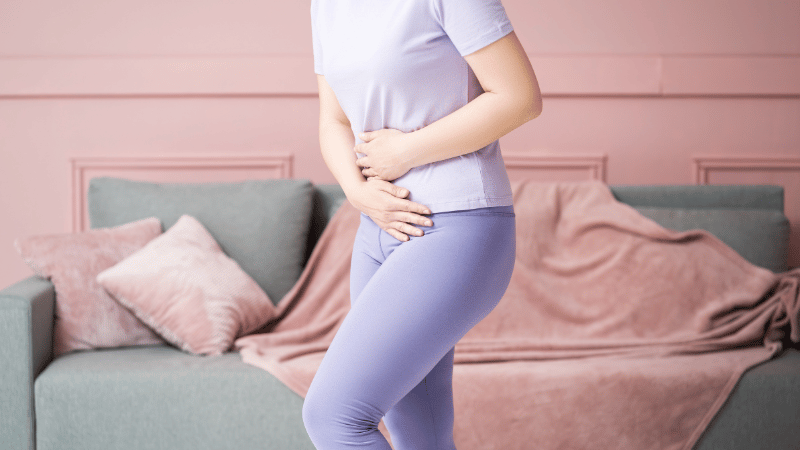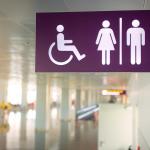
Although uterine fibroids usually don’t lead to actual weight gain, larger fibroids can cause visible bloating and abdominal distension, which might make it look like you’ve gained weight. In some cases, the fibroids themselves can weigh several pounds. They can also cause additional symptoms that contribute to weight gain.
If you’re experiencing bloating, pelvic pressure, or what feels like unexplained weight gain, conditions like uterine fibroids and adenomyosis could be contributing factors. While these conditions don’t typically cause fat gain, they can lead to an enlarged uterus, abdominal swelling, and a heavier sensation in the pelvic area — all of which may mimic weight gain.
Understanding the connection between uterine fibroids and weight gain can help in recognizing symptoms and seeking early diagnosis.
Can Fibroids Cause Weight Gain?
Fibroid weight gain is primarily the result of an enlarged uterus and bloating. As fibroids grow larger or if multiple fibroids develop, they can significantly increase the size and weight of the uterus, creating a noticeable fullness in the lower abdomen.
This abdominal weight gain is often mistaken for general weight gain or bloating, but this weight has a direct link to the size and number of fibroids. Women with larger fibroids may experience a more full or rounded stomach, which can resemble a pregnant belly.
How Much Do Fibroids Weigh?
The fibroid weight chart below offers insight into the typical weight of a small, medium, and large fibroid:
| How much does a 5 cm fibroid weigh? | A fibroid typically weighs less than half a pound at this size, similar to an avocado. |
| How much does a 7 cm fibroid weigh? | Weighing about 1 pound, this size is comparable to an orange. |
| How much does a 10 cm fibroid weigh? | This size may weigh around 1.5-2 pounds, roughly the size of a grapefruit. |
| How much does a 12 cm fibroid weigh? | A fibroid of this size can weigh approximately 2-3 pounds, similar to a small watermelon. |
The largest fibroid removed was reported to weigh over 100 lbs. This is a rare case, but fibroids can commonly weigh a few pounds, negatively impacting surrounding organs and causing many painful and unpleasant symptoms.
Schedule Your Consultation Today
How Fibroid Symptoms Can Impact Weight

Symptoms of uterine fibroids can lead to physical and emotional challenges that make maintaining a healthy lifestyle more difficult.
Physical Challenges
- Fatigue and Anemia: Heavy bleeding and anemia reduce energy levels, making physical activity more difficult and leading to gradual weight gain.
- Pain and Discomfort: Painful symptoms caused by fibroids make exercising uncomfortable or unappealing.
Emotional and Psychological Effects
- Impact on Self-Esteem: Larger or multiple fibroids can alter body image, leading to fear, anxiety, and low self-esteem, as shown in a Northwestern University study.
- Stress Eating: Anxiety and stress may lead to overeating or reliance on comfort foods, contributing to weight gain.
Abdominal Symptoms
- Bloating: Fibroids often cause abdominal bloating, leading to a heavier feeling and weight fluctuations.
- Constipation: Discomfort and bloating from constipation create a build-up of gas and stool, making the abdomen feel distended.
Hormonal Fluctuations
- Water Retention: Hormonal imbalances related to fibroids can lead to water retention.
- Appetite and Metabolism Changes: Fluctuations in estrogen and progesterone may affect appetite and metabolism, influencing weight gain.
They can cause painful and disruptive symptoms like heavy menstrual bleeding and lower back pain. However, uterine fibroids and weight gain are also connected because of related symptoms like hormonal fluctuations and an enlarged uterus.
If you are dealing with fibroids, we recommend seeking advice from our expert interventional radiologists at USA Fibroid Centers. A comprehensive medical imaging evaluation can clarify your condition and answer questions about treatment options.
How to Manage Fibroids and Weight Gain
If your belly feels fuller than usual, your clothes are fitting tighter, or you’re constantly battling bloating and pelvic discomfort, conditions like uterine fibroids and adenomyosis are common culprits behind these symptoms. While they may not lead to actual weight gain in the traditional sense, they can cause your uterus to enlarge, making your abdomen appear swollen or distended.
Understanding the connection between these gynecologic conditions and changes in your body shape is key to finding relief. From lifestyle adjustments to minimally invasive treatments like Uterine Fibroid Embolization (UFE), there are effective ways to manage your symptoms and feel more like yourself again.
1. Recognize the Symptoms
Both fibroids and adenomyosis can cause similar symptoms: heavy periods, pelvic pain, bloating, and abdominal fullness. If you’re noticing a change in how your clothes fit or increased fatigue, it’s worth exploring these conditions with your doctor.
2. Incorporate Gentle Movement
Staying active with low-impact exercises like walking, swimming, or yoga can help ease pressure, support circulation, and reduce inflammation — especially when chronic pelvic discomfort is involved.
3. Eat for Hormonal and Digestive Balance
A diet rich in whole foods, fiber, and anti-inflammatory ingredients can help your body manage hormone fluctuations. If you’re dealing with heavy bleeding (common with both fibroids and adenomyosis), include iron-rich foods to support energy levels.
4. Consider Minimally Invasive Treatments
When lifestyle adjustments aren’t enough, Uterine Fibroid Embolization (UFE) is a non-surgical treatment option that targets fibroids by cutting off their blood supply, causing them to shrink. While UFE is primarily for fibroids, some women with adenomyosis may also experience symptom relief from the procedure, depending on individual factors. Always consult a specialist to determine if UFE is appropriate for your condition.
5. Consult a Specialist
USA Fibroid Centers offer a minimally invasive, FDA-approved treatment called uterine fibroid embolization (UFE). UFE works by shrinking the fibroids and relieving painful symptoms associated with this condition. As the fibroids shrink, most patients notice a significant improvement in their symptoms after treatment.
If fibroids are interfering with your comfort or confidence, speak with a healthcare provider. They can guide you through diagnostic options and help you decide if a treatment like UFE is right for you. Our doctors are experts in this field and available for a consultation at one of our fibroid centers near you.
Schedule Consultation with USA Fibroid Centers

If fibroids are the reason for your weight gain, we recommend contacting a fibroid specialist from USA Fibroid Centers for diagnosis and treatment. We have many convenient locations nationwide, with compassionate and experienced fibroid specialists available for in-person consultations.
To learn more about fibroids and weight gain, find a USA Fibroid Centers location near you to talk to one of our fibroid specialists.
Fibroids and Weight Gain FAQs
Do Fibroids Make You Gain Weight?
Uterine fibroids and weight gain are mainly the result of an enlarged uterus due to large or multiple fibroids. These factors increase the size and weight of the uterus, creating a noticeable fullness in the lower abdomen. Along with fibroids, other health conditions, like PCOS, also can cause weight gain.
Do Fibroids Make it Hard to Lose Weight?
Fibroids can make losing weight more challenging. Symptoms like heavy bleeding, anemia, and constipation can create a cycle of inactivity and overeating that makes maintaining a healthy weight more difficult. According to Harvard Health Publishing, emotional anxiety and discomfort in general can lead to stress-eating or reliance on comfort foods.
Despite these challenges, medical treatments like uterine fibroid embolization (UFE) can help manage symptoms.
Can Small Fibroids Cause Weight Gain?
Many women with smaller uterine fibroids may not experience severe symptoms. However, some fibroids can grow to the size of a grapefruit, and some women may also develop multiple fibroids. Growth can occur even when women don’t experience symptoms, leaving them unaware of the possibility they have uterine fibroids.
How Long After Fibroid Removal Will It Take to Notice a Weight Change?
If the fibroids are large enough to noticeably increase your weight, removing them will eliminate that weight and any discomfort you’re experiencing as a result of your fibroids. You may notice weight loss after having UFE to treat your fibroids as they shrink over time. You might see other symptoms resolved, such as constipation, which can also impact your weight and how you eat.



